2014年全国卷高考英语试卷及答案
word版含答案2014年全国高考英语试题-新课标全国卷II二卷

word版含答案2014年全国高考英语试题-新课标全国卷II二卷第二部分英语知识运用(共两节,满分45分)第二节(共10小题;每小题1.5分,满分15分)阅读下面材料,在空白处填入适当的内容(不多于3个单词)或括号内单词的正确形式。
One morning, I was waiting at the bus stop, worried about 41 (be) late for school. There were many people waiting at the bus stop, 42 some of them looked very anxious and 43 (disappoint). When the bus finally came, we all hurried on board.I got a place next 44 the window, so I had a good view of the sidewalk. A boy on a bike 45 (catch) my attention. He was riding beside the bus and waving his arms. I heard a passenger behind me shouting to the driver, but he refused 46 (stop) until we reached the next stop. Still, the boy kept 47 (ride). He was carrying something over his shoulder and shouting. Finally, when we came to the next stop, the boy ran up to the door of the bus.I heard an excited conversation. Then the driver stood up and asked, “48 anyone lose a suitcase at the last stop?” A woman on the bus shouted, “Oh dear! It’s 49 (I).” She pushed her way to the driver and took the suitcase thankfully. Everyone on the bus began talking about what the boy had done, and the crowd of strangers 50 (sudden) became friendly to one another.第三部分写作(共两节,满分35分)第一节短文改错(共10小题;每小题I分,满分10分)假定英语课上老师要求同桌之间交换修改作文,请你修改你同桌写的以下作文。
2014年全国高考英语试题及答案-陕西卷
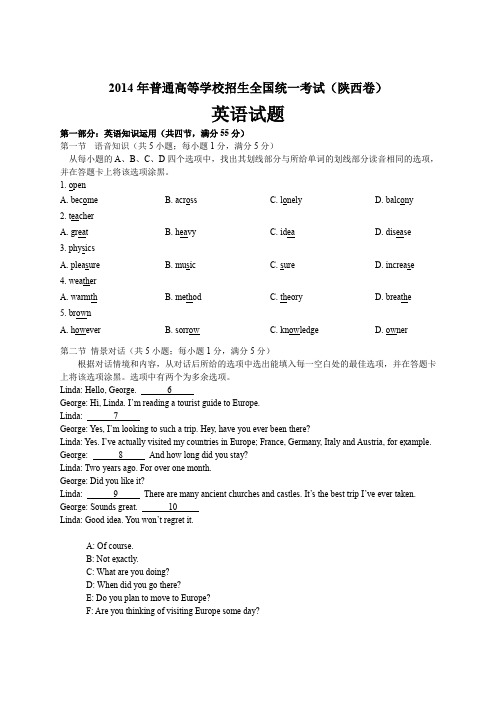
2014年普通高等学校招生全国统一考试(陕西卷)英语试题第一部分:英语知识运用(共四节,满分55分)第一节语音知识(共5小题;每小题1分,满分5分)从每小题的A、B、C、D四个选项中,找出其划线部分与所给单词的划线部分读音相同的选项,并在答题卡上将该选项涂黑。
1. openA. becomeB. acrossC. lonelyD. balcony2. teacherA. greatB. heavyC. ideaD. disease3. physicsA. pleasureB. musicC. sureD. increase4. weatherA. warmthB. methodC. theoryD. breathe5. brownA. howeverB. sorrowC. knowledgeD. owner第二节情景对话(共5小题;每小题1分,满分5分)根据对话情境和内容,从对话后所给的选项中选出能填入每一空白处的最佳选项,并在答题卡上将该选项涂黑。
选项中有两个为多余选项。
Linda: Hello, George. 6George: Hi, Linda. I’m reading a tourist guide to Europe.Linda: 7George: Yes, I’m looking to such a trip. Hey, have you ever been there?Linda: Yes. I’ve actually visited my countries in Europe; France, Germany, Italy and Austria, for example. George: 8 And how long did you stay?Linda: Two years ago. For over one month.George: Did you like it?Linda: 9 There are many ancient churches and castles. It’s the best trip I’ve ever taken. George: Sounds great. 10Linda: Good idea. You won’t regret it.A: Of course.B: Not exactly.C: What are you doing?D: When did you go there?E: Do you plan to move to Europe?F: Are you thinking of visiting Europe some day?G: I decide to make a trip next October on my annual leave.第三节语法和词汇知识(共15小题;每小题1分,满分15分)从每小题的A、B、C、D四个选项中,选出可以填入空白处的最佳选项,并在答题卡上将该选项涂黑。
(完整word版)2014年高考英语全国卷1

2014年普通高等学校招生全国统一考试(山西新课标I)英语第二部分阅读理解(共两节,满分60分)第一节(共15小题;每小题3分,满分45分)阅读下列短文,从每题所给的四个选项(A、B、C和D)中,选出最佳选项,并在答题卡上将该项涂黑。
AThe Cambridge Science Festival Curiosity ChallengeDare to Take the Curiosity Challenge!The Cambridge Science Festival (CSF) is pleased to inform you of the sixth annual Curiosity Challenge. The challenge invites, even dares school students between the ages of 5 and 14 to create artwork or a piece of writing that shows their curiosity and how it inspires them to explore their world.Students are being dared to draw a picture, write an article, take a photo or write a poem that shows what they are curious about. To enter the challenge, all artwork or pieces of writing should be sent to the Cambridge Science Festival, MIT Museum, 265 Mass Avenue, Cambridge 02139 by Friday, February 8th.Students who enter the Curiosity Challenge and are selected as winners will be honored at a special ceremony during the CSF on Sunday, April 21st. Guest speakers will also present prizes to the students. Winning entries will be published in a book. Student entries will be exhibited and prizes will be given. Families of those who take part will be included in the celebration and brunch will be served.Between March 10th and March 15th, each winner will be given the specifics of the closing ceremony and the Curiosity Challenge celebration. The program guidelines and other related information are available at: .21. Who can take part in the Curiosity Challenge?A. School students.B. Cambridge locals.C. CSF winners.D. MIT artists.22. When will the prize-giving ceremony be held?A. On February 8th.B. On March 10th.C. On April 21st.D. On March 15th.23. What type of writing is this text?A. An exhibition guide.B. An art show review.C. An announcement.D. An official report.BPassenger pigeons(旅鸽) once flew over much of the United States in unbelievable numbers. Written accounts from the 18th and 19th centuries described flocks(群) so large that they darkened the sky for hours.It was calculated that when its population reached its highest point, there were more than 3 billion passenger pigeons – a number equal to 24 to 40 percent of the total bird population in theUnited States, making it perhaps the most abundant bird in the world. Even as late as 1870 when their numbers had already become smaller, a flock believed to be 1 mile wide and 320 miles (about 515 kilometers) long was seen near Cincinnati.Sadly, the abundance of passenger pigeons may have been their undoing. Where the birds were most abundant, people believed there was an ever-lasting supply and killed them by the thousands. Commercial hunters attracted them to small clearings with grain, waited until pigeons had settled to feed, then threw large nets over them, taking hundreds at a time. The birds were shipped to large cities and sold in restaurants.By the closing decades of the 19th century, the hardwood forests where passenger pigeons nested had been damaged by Americans’ need for wood, which scattered (驱散) the flocks and forced the birds to go farther north, where cold temperatures and spring storms contributed to their decline. Soon the great flocks were gone, never to be seen again.In 1897, the state of Michigan passed a law prohibiting the killing of passenger pigeons, but by then, no sizable flocks had been seen in the state for 10 years. The last confirmed wild pigeon in the United States was shot by a boy in Pike County, Ohio, in 1900. For a time, a few birds survived under human care. The last of them, known affectionately as Martha, died at the Cincinnati Zoological Garden on September 1, 1914.24. In the 18th and early 19th centuries, passenger pigeons _______.A. were the biggest bird in the worldB. lived mainly in the south of AmericaC. did great harm to the natural environmentD. were the largest bird population in the US25. The underlined word “undoing” probably refers to the pigeons’ ______.A. escapeB. ruinC. liberationD. evolution26. What was the main reason for people to kill passenger pigeons?A. To seek pleasure.B. To save other birds.C. To make money.D. To protect crops.27. What can we infer about the law passed in Michigan?A. It was ignored by the public.B. It was declared too late.C. It was unfair.D. It was strict.CA typical lion tamer (驯兽师) in people’s mind is an entertainer holding a whip (鞭) and a chair. The whip gets all of the attention, but it’s mostly for show. In reality, it’s the chair that does the important work. When a lion tamer holds a chair in front of the lion’s face, the lion tries to focus on all four legs of the chair at the same time. With its focus divided, the lion becomes confused and is unsure about what to do next. When faced with so many options, the lion chooses to freeze and wait instead of attacking the man holding the chair.How often do you find yourself in the same position as the lion? How often do you have something you want to achieve (e.g. lose weight, start a business, travel more) ---- only to end up confused by all of the options in front of you and never make progress?This upsets me to no end because while all the experts are busy debating about which option is best, the people who want to improve their lives are left confused by all of the conflicting information. The end result is that we feel like we can’t focus or that we’re focused on the wrongthings, and so we take less action, make less progress, and stay the same when we could be improving.It doesn’t have to be that way. Anytime you find the world waving a chair in your face, remember this: All you need to do is focus on one thing. You just need to get started. Starting before you feel ready is one of the habits of successful people. If you have somewhere you want to go, something you want to accomplish, someone you want to become … take immediate action. If you’re clear about where you want to go, the rest of the world will either help you get there or get out of the way.28. Why does the lion tamer use a chair?A. To show off his skills.B. To trick the lion.C. To get ready for a fight.D. To entertain the audience.29. In what sense are people similar to a lion facing a chair?A. They feel puzzled over choices.B. They hold on to the wrong things.C. They find it hard to make changed.D. They have to do something for show.30. What is the author’s at titude towards the experts mentioned in Paragraph 3?A. Tolerant.B. Doubtful.C. Respectful.D. Supportive.31. When the world is “waving a chair in your face”, you’re advised to _______.A. wait for a better chanceB. break your old habitsC. make a quick decisionD. ask for clear guidanceDAs more and more people speak the global languages of English, Chinese, Spanish, and Arabic, other languages are rapidly disappearing. In fact, half of the 6,000—7,000 languages spoken around the world today will likely die out by the next century, according to the United Nations Educational, Scientific, and Cultural Organization (UNESCO).In an effort to prevent language loss, scholars from a number of organizations ---- UNESCO and National Geographic among them ---- have for many years been documenting dying languages and the cultures they reflect.Mark Turin, a scientist at the Macmillan Center, Yale University, who specializes in the languages and oral traditions of the Himalayas, is following in that tradition. His recently published book, A grammar of Thangmi with an Ethnolinguistic Introduction to the Speakers and Their Culture,grows out of his experience living, working, and raising a family in a village in Nepal.Documenting the Thangmi language and culture is just a starting point for Turin, who seeks to include other languages and oral traditions across the Himalayan reaches of India, Nepal, Bhutan, and China. But he is not content to simply record these voices before they disappear without record.At the University of Cambridge Turin discovered a wealth of important materials ---- including photographs, films, tape recordings, and field notes ---- which had remained unstudied and were badly in need of care and protection.Now, through the two organizations that he has founded ---- the Digital Himalaya Project and the World Oral Literature Project ---- Turin has started a campaign to make such documents, found in libraries and stores around the world, available not just to scholars but to the younger generations of communities from whom the materials were originally collected. Thanks to digital technology and the widely available Internet, Turin notes, the endangered languages can be savedand reconnected with speech communities.32. Many scholars are making efforts to _____.A. promote global languageB. rescue disappearing languagesC. search for language communitiesD. set up language research organizations33. What does “that tradition” in Paragraph 3 refer to?A. Having full records of the languages.B. Writing books on language teaching.C. Telling stories about language users.D. Living with the native speakers.34. What is Turin’s book based on?A. The cultural studies in India.B. The documents available at Yale.C. His language research in Bhutan.D. His personal experience in Nepal.35. Which of the following best describes Turin’s work?A. Write, sell and donate.B. Record, repair and reward.C. Design, experiment and report.D. Collect, protect and reconnect.第二节(共5小题;每小题3分,满分15分)根据短文内容,从短文后的选项中选出能填入空白处的最佳选项。
2014年全国高考英语试题及答案-江西卷
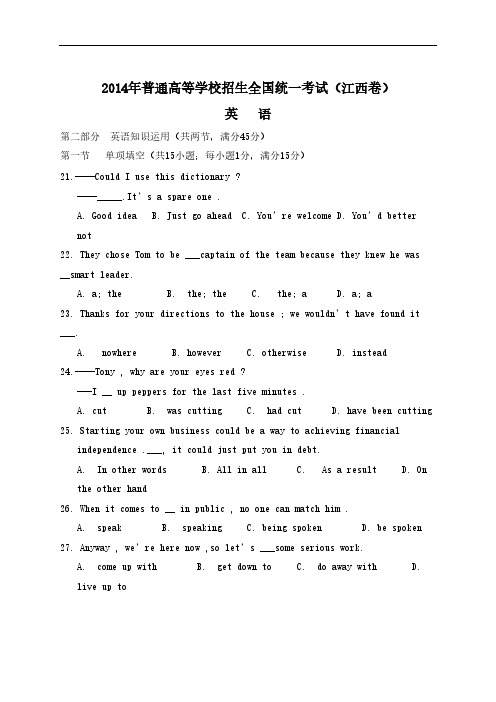
2014年普通高等学校招生全国统一考试(江西卷)英语第二部分英语知识运用(共两节,满分45分)第一节单项填空(共15小题;每小题1分,满分15分)21.----Could I use this dictionary ?----_____.It’s a spare one .A. Good ideaB. Just go aheadC. You’re welcomeD. You’d betternot22. They chose Tom to be ___captain of the team because they knew he was __smart leader.A. a; theB. the; theC. the; aD. a; a23. Thanks for your directions to the house ; we wouldn’t have found it ___.A. nowhereB. howeverC. otherwiseD. instead24.----Tony , why are your eyes red ?---I __ up peppers for the last five minutes .A. cutB. was cuttingC. had cutD. have been cutting25. Starting your own business could be a way to achieving financialindependence .___, it could just put you in debt.A. In other wordsB. All in allC. As a resultD. Onthe other hand26. When it comes to __ in public , no one can match him .A. speakB. speakingC. being spokenD. be spoken27. Anyway , we’re here now ,so let’s ___some serious work.A. come up withB. get down toC. do away withD.live up to28. Among the many dangers_-- sailors have to face , probably the greatest of all is fog .A. whichB. whatC. whereD. when29. I don’t believe what you said , but if you can prove it , you may be able to __-me .A. convinceB. informC. guaranteeD. refuse30. Life is unpredictable ; even the poorest __become the richest .A. shallB. mustC. needD. might31. ___nearly all our money , we couldn’t afford to stay at a hotel .A. Having spentB. To spentC. SpentD. To havespent32. ---When shall I call, in the morning or afternoon?----___. I’ll be in all day.A.AnyB. NoneC. NeitherD. Either33. It is unbelievable that Mr. Lucas Leads a simple life __his great wealth .A. withoutB. despiteC. inD. to34.He is thought ___foolishly .Now he has no one but himself to blame for losing the job .A. to actB. to have actedC. actingD. havingacted35. It was the middle of the night __ my father woke me up and told me towatch the football game.A.thatB. asC. whichD. when第二节完形填空(共20小题;每小题1.5分,满分30分)阅读下面短文,掌握其大意。
2014年全国高考英语试题与答案-新课标1
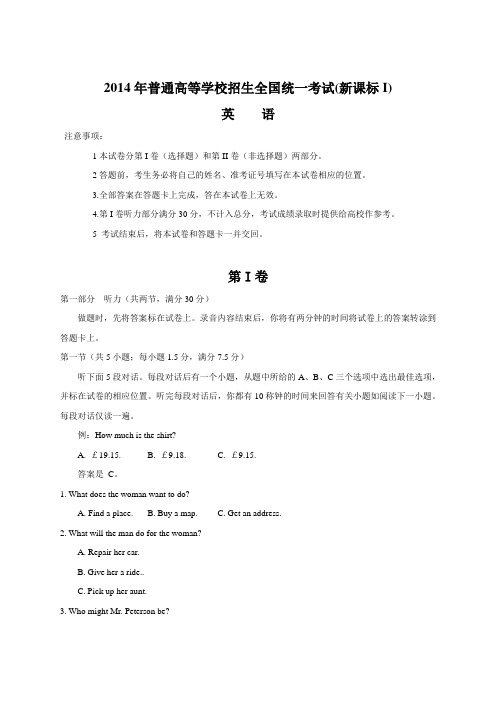
2014年普通高等学校招生全国统一考试(新课标I)英语注意事项:1本试卷分第I卷(选择题)和第II卷(非选择题)两部分。
2答题前,考生务必将自己的姓名、准考证号填写在本试卷相应的位置。
3.全部答案在答题卡上完成,答在本试卷上无效。
4.第I卷听力部分满分30分,不计入总分,考试成绩录取时提供给高校作参考。
5 考试结束后,将本试卷和答题卡一并交回。
第I卷第一部分听力(共两节,满分30分)做题时,先将答案标在试卷上。
录音内容结束后,你将有两分钟的时间将试卷上的答案转涂到答题卡上。
第一节(共5小题;每小题1.5分,满分7.5分)听下面5段对话。
每段对话后有一个小题,从题中所给的A、B、C三个选项中选出最佳选项,并标在试卷的相应位置。
听完每段对话后,你都有10称钟的时间来回答有关小题如阅读下一小题。
每段对话仅读一遍。
例:How much is the shirt?A. £19.15.B. £9.18.C. £9.15.答案是C。
1. What does the woman want to do?A. Find a place.B. Buy a map.C. Get an address.2. What will the man do for the woman?A. Repair her car.B. Give her a ride..C. Pick up her aunt.3. Who might Mr. Peterson be?A. A new professor.B. A department head.C. A company director.4. What does the man think of the book?A. Quite difficult..B. Very interesting.C. Too simple.5. What are the speakers talking about?A. Weather.B. Clothes.C. News.第二节(共15小题;每小题1.5分,满分22.5分)听下面5段对话或独白。
2014年高考新课标:英语及答案
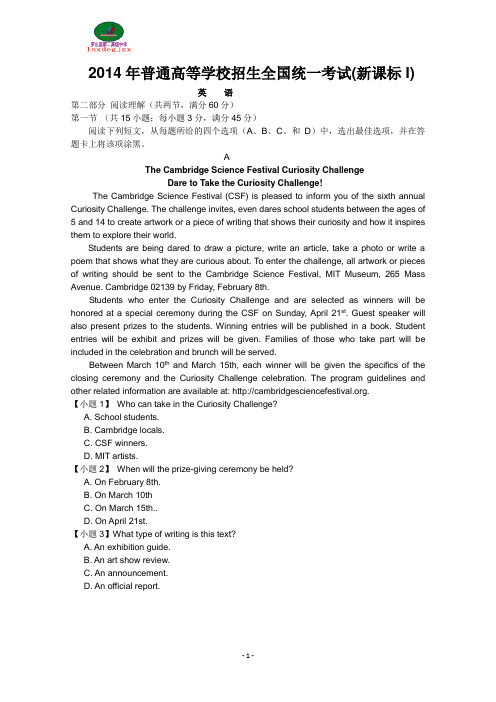
2014年普通高等学校招生全国统一考试(新课标I)英语第二部分阅读理解(共两节,满分60分)第一节(共15小题;每小题3分,满分45分)阅读下列短文,从每题所给的四个选项(A、B、C、和D)中,选出最佳选项,并在答题卡上将该项涂黑。
AThe Cambridge Science Festival Curiosity ChallengeDare to Take the Curiosity Challenge!The Cambridge Science Festival (CSF) is pleased to inform you of the sixth annual Curiosity Challenge. The challenge invites, even dares school students between the ages of 5 and 14 to create artwork or a piece of writing that shows their curiosity and how it inspires them to explore their world.Students are being dared to draw a picture, write an article, take a photo or write a poem that shows what they are curious about. To enter the challenge, all artwork or pieces of writing should be sent to the Cambridge Science Festival, MIT Museum, 265 Mass Avenue. Cambridge 02139 by Friday, February 8th.Students who enter the Curiosity Challenge and are selected as winners will be honored at a special ceremony during the CSF on Sunday, April 21st. Guest speaker will also present prizes to the students. Winning entries will be published in a book. Student entries will be exhibit and prizes will be given. Families of those who take part will be included in the celebration and brunch will be served.Between March 10th and March 15th, each winner will be given the specifics of the closing ceremony and the Curiosity Challenge celebration. The program guidelines and other related information are available at: .【小题1】Who can take in the Curiosity Challenge?A. School students.B. Cambridge locals.C. CSF winners.D. MIT artists.【小题2】When will the prize-giving ceremony be held?A. On February 8th.B. On March 10thC. On March 15th..D. On April 21st.【小题3】What type of writing is this text?A. An exhibition guide.B. An art show review.C. An announcement.D. An official report.BPassenger pigeons(旅鸽)once flew over much of the United States in unbelievable numbers. Written accounts from the 18th and 19th centuries described flocks(群)so large that they darkened the sky for hours.It was calculated that when its population reach its highest point, there were more than 3 billion passenger pigeons – a number equal to 24 to 40 percent of the total bird population in the United States, making it perhaps the most abundant birds in the world. Even as late as 1870 when their numbers had already become smaller, a flock believed to be 1 mile wide and 320 miles (about 515 kilometers) long was seen near Cincinnati.Sadly, the abundance of passenger pigeons may have been their undoing. Where the birds were abundant, people believed there was an ever-lasting supply and killed them by the thousands. Commercial hunters attracted them to small clearings with grain, waited until pigeons had settled to feed, then threw large nets over them, taking hundreds at a time. The birds were shipped to large cities and sold in restaurants.By the closing decades of the 19th century, the hardwood forests where passenger pigeons nested had been damaged by Americans’ need for wood, which scattered(驱散)the flocks and forced the birds to go farther north, where cold temperatures and spring storms contributed to their decline. Soon the great flocks were gone, never to be seen again.In 1897, the state of Michigan passed a law prohibiting the killing of passenger pigeons, but by then, no sizable flocks had been seen in the state for 10 years. The last confirmed wild pigeon in the United States was shot by a boy in Pike County, Ohio, in 1900. For a time, a few birds survived under human care. The last of them, known affectionately as Martha, died at the Cincinnati Zoological Garden in September 1, 1914.【小题1】In the 18th and early 19th centuries, passenger pigeons _______.A. were the biggest bird in the worldB. lived mainly in the south of AmericaC. did great harm to the natural environmentD. Were the largest population in the US 【小题2】The underlined word ―undoing‖ probably refers to the pigeons’ _______.A. escapeB. ruinC. liberationD. evolution【小题3】What was the main reason for people to kill passenger pigeons?A. To seek pleasure.B. To save other birds.C. To make money.D. To protect crops.【小题4】What can we infer about the law passed in Michigan?A. It was ignored by the public.B. It was declared too late.C. It was unfair.D. It was strict.【文章大意】本文是一篇记叙文。
2014年高考英语全国卷2有答案

绝密★启用前2014普通高等学校招生全国统一考试(全国新课标卷2)英语使用地区:考听力,海南、宁夏、黑龙江、吉林、辽宁、新疆、内蒙古、青海、广西、西藏;不考听力(卷面分值120分),云南、贵州、甘肃本试卷分第Ⅰ卷(选择题)和第Ⅱ卷(非选择题)两部分。
共150分,共12页。
考试时间结束后,将本试卷和答题卡一并交回。
注意事项:1. 答题前,考生先将自己的姓名、准考证号码填写清楚,将条形码准确粘贴在条形码区域内。
2. 选择题必须使用2B 铅笔填涂;非选择题必须使用0.5毫米黑色字迹的签字笔书写,字体工整、笔迹清楚。
3. 请按照题号顺序在各题目的答题区域内作答,超出答题区域书写的答案无效;在草稿纸、试题卷上答题无效。
4. 保持卡面清洁,不要折叠、不要弄破、弄皱,不准使用涂改液、修正带、刮纸刀。
第Ⅰ卷第一部分 听力(共两节,满分30分)做题时,先将答案标在试卷上,录音内容结束后,你将有两分钟的时间将试卷上的答案转涂到答题卡上。
第一节 (共5小题;每小题1.5分,满分7.5分)听下面5段对话。
每段对话后有一个小题,从题中所给的A 、B 、C 三个选项中选出最佳选项,并标在试卷的相应位置。
听完每段对话后,你都有10秒钟的时间来回答有关小题和阅读下一小题。
每段对话仅读一遍。
例: How much is the shirt? A. £19.15.B. £9. 18.C. £9.15.答案是C 。
1. What does the woman want to do? A. Find a place.B. Buy a map.C. Get an address.2. What will the man do for the woman? A. Repair her car.B. Give her a ride.C. Pick up her aunt.3. Who might Mr. Peterson be? A.A new professor.B.A department head.C.A company director.4. What does the man think of the book?-------------在--------------------此--------------------卷--------------------上--------------------答--------------------题--------------------无--------------------效姓名________________ 准考证号_____________A. Quite difficult.B. Very interesting.C. Too simple.5. What are the speakers talking about?A. Weather.B. Clothes.C. News.第二节(共15小题;每小题1.5分,满分22.5分)听下面5段对话或独白。
2014年全国高考英语听力卷试题、答案 听力原文
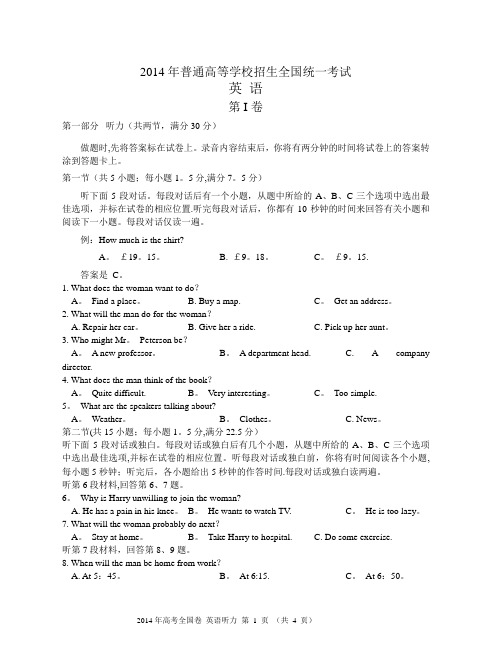
2014年普通高等学校招生全国统一考试英语第I卷第一部分听力(共两节,满分30分)做题时,先将答案标在试卷上。
录音内容结束后,你将有两分钟的时间将试卷上的答案转涂到答题卡上。
第一节(共5小题;每小题1。
5分,满分7。
5分)听下面5段对话。
每段对话后有一个小题,从题中所给的A、B、C三个选项中选出最佳选项,并标在试卷的相应位置.听完每段对话后,你都有10秒钟的时间来回答有关小题和阅读下一小题。
每段对话仅读一遍。
例:How much is the shirt?A。
£19。
15。
B. £9。
18。
C。
£9。
15.答案是C。
1. What does the woman want to do?A。
Find a place。
B. Buy a map. C。
Get an address。
2. What will the man do for the woman?A. Repair her car。
B. Give her a ride.C. Pick up her aunt。
3. Who might Mr。
Peterson be?A。
A new professor。
B。
A department head. C. A company director.4. What does the man think of the book?A。
Quite difficult. B。
Very interesting。
C。
Too simple.5。
What are the speakers talking about?A。
Weather。
B。
Clothes。
C. News。
第二节(共15小题;每小题1。
5分,满分22.5分)听下面5段对话或独白。
每段对话或独白后有几个小题,从题中所给的A、B、C三个选项中选出最佳选项,并标在试卷的相应位置。
听每段对话或独白前,你将有时间阅读各个小题,每小题5秒钟;听完后,各小题给出5秒钟的作答时间.每段对话或独白读两遍。
- 1、下载文档前请自行甄别文档内容的完整性,平台不提供额外的编辑、内容补充、找答案等附加服务。
- 2、"仅部分预览"的文档,不可在线预览部分如存在完整性等问题,可反馈申请退款(可完整预览的文档不适用该条件!)。
- 3、如文档侵犯您的权益,请联系客服反馈,我们会尽快为您处理(人工客服工作时间:9:00-18:30)。
2014年普通高等学校招生全国统一考试(浙江)英语试题选择题部分(共80分)第一部分:英语知识应用(共两节,满分30分)第一节:单项填空(共20小题,每小题0.5分,满分10分)从A、B、C和D四个选项中,选出可以填入空白处的最佳选项,并在答题纸上将该选项标号涂黑。
1. ---I am going to Spain fort a holiday soon.--- ______.A. It’s my pleasureB. Never mindC. Leave it aloneD. Good for you2. The paper is due next month, and I am working seven days ______ week, often long into______ night.A. a; theB. the; 不填C. a; aD. 不填;the3.An average of just 18.75cm of rain fell last year, making ______ the driest year since Californiabecame a state in 1850.A. eachB. itC. thisD. one4.Joe is proud and ______, never admitting he is wrong and always looking for someone else to blame.A. strictB. sympatheticC. stubbornD. sensitive5.I don’t become a serious climber until the fifth grade, ______ I went up to rescue a kite that was stuckin the branches of a tree.A. whenB. whereC. whichD. why6.We most prefer to say yes to the ______ of someone we know and like.A. attemptsB. requestsC. doubtsD. promisesst week a tennis ball hit me on the head, but I tried to _______ the pain, believing that it would goaway sooner or later.A. shareB. realizeC. ignoreD. cause8.“Every time you eat a sweet, drink green tea.” This is _____ my mother used to tell me.A. whatB. howC. thatD. whether9.No matter how carefully you plan your finances, no one can _____ when the unexpected will happen.A. proveB. implyC. demandD. predict10.While staying in the village, James unselfishly shared whatever he had with the villagers withoutasking for anything ______ .A. in returnB. in commonC. in turnD. in place11.Sofia looked around at all the faces: she had the impression that she _____ most of the guestsbefore.A. has seenB. had seenC. sawD. would see12.Facing up to your problem ____ running away from them is the best approach to working things out.A. more thanB. rather thanC. along withD.or rather13.The aim of education is to teach young people to think for themselves and not follow others ______ .A. blindlyB. unwillinglyC. closelyD. carefully14.Annie Salmon, disabled, is attended throughout her school days by a nurse _______ to guard her.A. to appointB. appointingC. appointedD. having appointed15.Cathy had quit her job when her son was born _______ she could stay home and raise her family.A. now thatB. as ifC. only ifD. so that16.They were abroad during the months when we were carrying out the investigation, or they _____ toour help.A. would have comeB. could comeC. have comeD. had come17.People won’t pay attention to you when they still have a lot of ideas of their own crying _______expression.A. fromB. overC. withD. for18.There’s no reason to be disappointed. ______, this could be rather amusing.A. Above allB. As a resultC. In additionD. As a matter of fact19.How could you ______ such a fantastic job when you have been out of work for months.A. turn offB. turn inC.turn downD. turn to20.—I’d like a wake-up call at 7:00 a.m., please!—OK, _______.A. help yourselfB. You will certainly make itC. just do what you likeD. I’ll make sure you get one第二节:完形填空(共20小题;每小题1分,满分20分)阅读下面短文,掌握其大意,然后从21—40各题所给的四个选项中(A、B、C和D)中,选出最佳选项,并在答题纸上将该选项标号涂黑。
I had worried myself sick over Simon’s mother coming to see me. I was a new 21 , and I gave an honest account of the students’ work. In Simon’s case, the grades were awfully low. He couldn’t read his own handwriting. 22 he was a bright student. He discussed adult subjects with nearly adult comprehension. His work in no way reflected his 23 .So when Simon’s mother entered the room, my palms(手掌心) were sweating. I was completely 24 for her kisses on both my cheeks. “I came to thank you,” she said, surprising me beyond speech. 25 me, Simon had become a different person. He talked of how he 26 me, he had began to make friends, and for the first time in his twelve years, hehad 27 spent an afternoon at a friend’s house. She wanted to tell me how grateful she was for the 28 I had nurtured(培养) in her son. She kissed me again and left.I sat, stunned (惊呆), for about half an hour, 29 what had just happened. How did I make such a life-changing difference to that boy without 30 knowing it? What I finally came to 31 was one day, several months before, when some students were 32 reports in the front of the class, Jeanne spoke 33 , and to encourage her to raise her voice, L had sai, “Speak up. Simon’s the expert on this. He is the 34 one you have to convince, and he can’t hear you in the 35 of the room.” That was it. From that day on, Simon had sat up straighter, paid more attention, 36 more, and became happy. And it was all because he 37 to be the last kid in the last row. The boy who most needed 38 was the one who took the last seat that day.It taught me the most 39 lesson over the years of my teaching career, and I’m thankful that it came 40 and positively. A small kindness can indeed make a difference.21. A. cleaner B. reporter C. monitor D. teacher22. A. Or B. And C. But D. So23. A. courage B. abilities C. feelings D. dream24. A. desperate B. responsible C. unprepared D. unsuitable25. A. Because of B. In spite of C. Apart from D. As for26. A. loved B. envied C. pleased D. criticized27. A. gradually B. constantly C. recently D. obviously28. A. self-respect B. self-doubt C. self-pity D. self-defence29. A. imagining B. observing C. wondering D. regretting30. A. also B. even C. always D. still31. A. expect B. remember C. believe D. accept32. A. writing B. reviewing C. editing D. giving33. A. quietly B. repeatedly C. quickly D. firmly34. A. lucky B. lonely C. only D. likely35. A. entrance B. middle C. front D. back36. A. slept B. smiled C. shouted D. quarreled37. A. intended B. pretended C. refused D. happened38. A. change B. praise C. thanks D. visits39. A. difficult B. painful C. valuable D. enjoyable40. A. early B. slowly C. frequently D. occasionally第二部分阅读理解(第一节20小题,第二节5小题,满分50分)第一节:阅读下列材料,从每题所给的四个选项(A、B、C和D)中,选出最佳选项,并在答题纸上将该选项标号涂黑。
